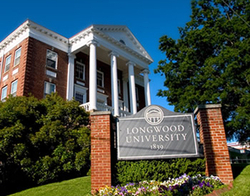
Teachers in Virginia have a new resource that puts the Chesapeake Bay front and center in their lesson plans.
Longwood University geography professor Dr. Ed Kinman and Katie Register, director of Longwood’s Clean Virginia Waterways, are leading two sessions for the online program designed to provide educators in the Chesapeake Bay watershed with the tools they need to teach about this integral feature of Virginia’s geography.
Forty teachers in Virginia have been selected to participate in the online course and in a two-day session in November called "Integrating Perspectives on the Chesapeake Bay through Civic Engagement." More than 500 teachers—who range from 4th to 12th grade—from the East Coast are participating in the course.
A new 10-course online program will be paired with two on-site training sessions to develop critical tools for teachers in the Bay watershed. Longwood University faculty and staff are kicking off the online program with a pair of sessions that will lead into a November hands-on workshop at historic Stratford Hall. Dr. Joe Garcia, professor of geography and earth science, will join Kinman and Register for the hands-on workshop.
"This hybrid of online and in-person instruction allows us to devote a great deal of time to hands-on activities," said Kinman. "We are really challenging teachers from all over the East Coast to think differently about how they engage with their local watersheds, and what kind of impact they can make for future generations.
The hybrid program is made possible by a two-year grant from the National Oceanic and Atmospheric Administration through the National Geographic Society. Participating teachers receive grant funds for taking students into the field on watershed investigations. More than 50 teachers participated in last year’s institute.
The first online unit, taught by Kinman, will focus on the importance of geographic literacy. The second, taught by Register, will explore watersheds and the importance of taking students outside to study waterways. It will also include a Google Hangout with Richard Louv, author of the groundbreaking book "Last Child in the Woods."
"This is part of a larger school of thought called geo-literacy," said Kinman. "Teachers need to understand the world around them through physical, biological and social systems. There are implications for the physical world in English, social studies, history classes and so many more. This course challenges teachers to think about geo-literacy through a broader lens, and figure out ways to use geography as a bridge across other disciplines."
This year’s course is a pilot program for future massive open online courses from the National Geographic Society.

